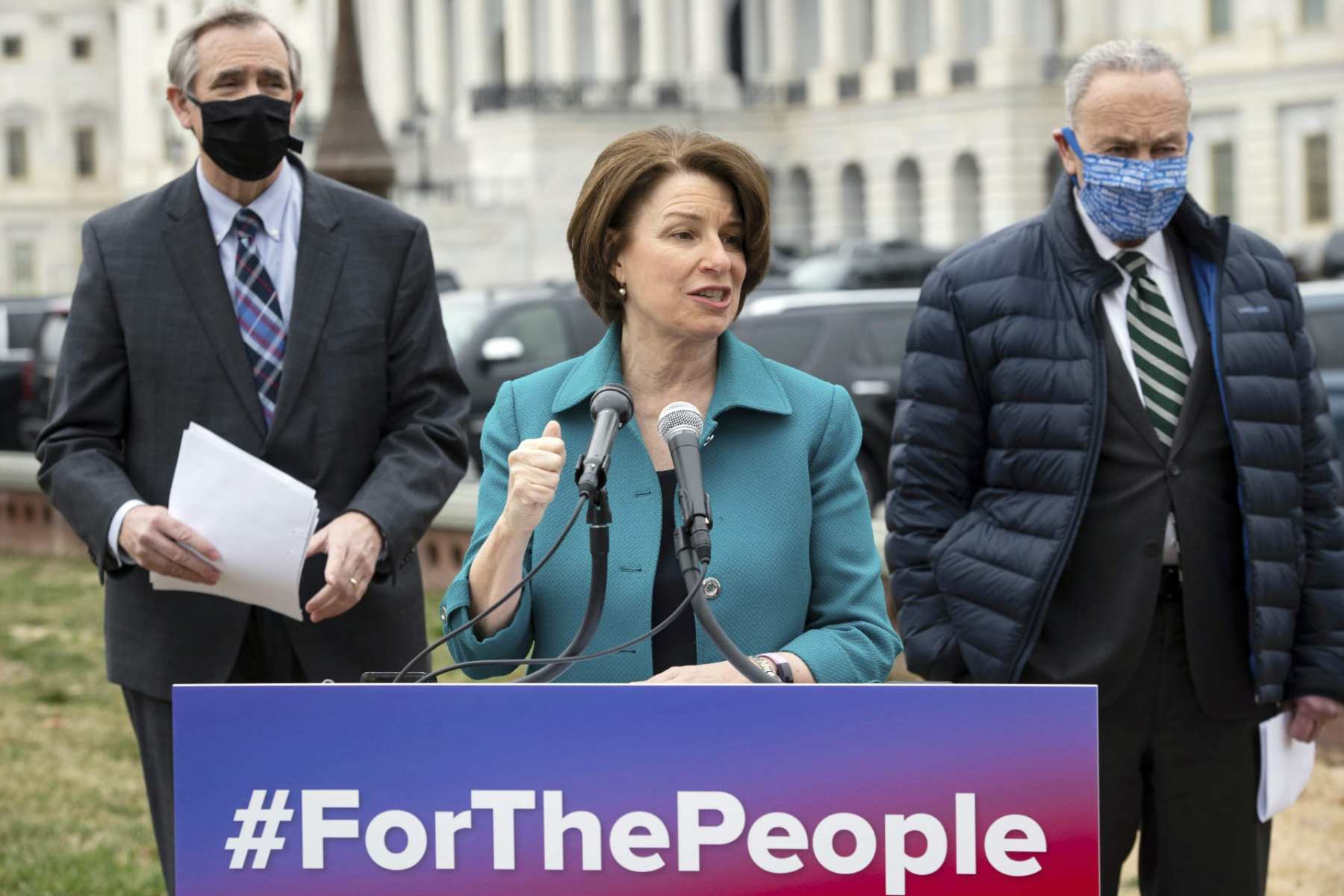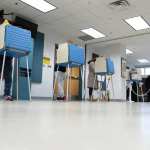The U.S. Senate’s rules panel on Wednesday will begin debating a sweeping voting access and ethics bill offered by Democrats known as the “For the People Act,” which is intended to expand voting rights and curb the influence of money in politics.
The legislation passed the Democratic-controlled House of Representatives earlier this month as Republican-controlled state legislatures across the country pushed to implement new restrictions on voting after record turnout in the 2020 elections. There was no evidence of irregularities that affected the outcome of the election, which some officials in defeated President Donald Trump’s administration called “the most secure in American history.”
Democratic Sen. Amy Klobuchar of Minnesota, who chairs the Senate Rules Committee, detailed the For the People Act to The 19th. She explained why she thinks the proposed legislation has a chance of becoming law in the evenly divided chamber after stalling in previous congressional sessions and why she supports changing Senate procedure to get it done. While Klobuchar has said for some time that she was open to making changes to the filibuster, she recently told Mother Jones she thinks the Senate should get rid of the requirement that means most legislation needs 60 votes to pass.
What is the For the People Act and what are its most important elements?
The For the People Act is about making it easier for our democracy to work and giving people a say. There’s a reason we use the first few words of the Constitution in describing it, and that is that we the people are the fundamental source of our democracy. And unfortunately, in the words of our new senator, [Raphael] Warnock of Georgia, there are some people who don’t want some people to vote, and that’s why it’s so important to put these protections in place: first, making voting easier; second, getting big money out of politics; third, strengthening the ethics rules. We had a record number of Americans vote — 160 million, nearly — and you wonder how that happened in the middle of a public health crisis, a horrific pandemic? Well, it’s because a lot of states made it easier. They took requirements that you needed a notary to get an absentee ballot and they made vote by mail the norm, while still allowing people to vote in person. They opened up early voting for safety reasons. And to take that all away with over 250 bills that have been introduced now across the country in state legislatures would be a travesty. It is Exhibit A for why we need to pass this bill.
Voting access is an issue that you’ve been working on generally for some time now. This bill was around during the last Congress but not taken up by the Senate. Why do you think things could be different this time around?
People are very aware after what happened last year that there are people trying to take away the vote. I think before, maybe it was just a bunch of studies and bills in certain states and obvious voter suppression, but now it’s become a national discussion because people know very well about the lawsuits, and the insurrection, that’s been a major shift. The second thing this is, the first time I’ve ever gotten to have a hearing. We’ve never had a hearing in the U.S. Senate on this bill because we [Democrats] didn’t have the gavel. Now — and this is the full circle of our democracy — because people were allowed to vote in Georgia, because people really pushed, people like Stacey Abrams, so that happened. We [Democrats] now have the U.S. Senate because the people voted and they voted for [Sen. Jon] Ossoff and Warnock [Georgia’s newly elected Democratic senators] and so now we’re having the hearing and now we can pass the bill. In fact, right now as we speak, there are people in Georgia trying to limit the right to vote. So, to me, this has been a year of focus on voting that changes the dialogue, and we also have the ability to have the gavel and bring the bill to the floor after we get it through committee.
This is the first hearing on this bill in the Senate. What should people expect? What might the process look like?
This is going to be the major hearing, and part of that is because we may have other hearings about voting in the Rules Committee and about ideas, but it was really important to have one major hearing. The House has already passed this bill. We are having some key witnesses, including Eric Holder, the former attorney general, who now works on voting rights issues. [Michigan] Secretary of State Jocelyn Benson is an expert on this and made a bunch of reforms in her state. The director of the Brennan Center [which tracks legislation on voting] will be testifying. Fred Wertheimer, who is the former president of Common Cause, and probably the most interesting name among them is the former Republican chair of the Federal Election Commission, Trevor Potter, he’s testifying for us, he’s testifying for the bill. Tiffany Muller, the president of End Citizens United, she’s also testifying.
Do you think that this bill is something that the two parties in the Senate can come together on? Has there been any initial outreach to your Republican colleagues? Do you think there’s space for people to work together on this?
There are nine major provisions in this bill that are bipartisan, so let’s start with that, including a number of mine. I have 15 things in here but one of them is the Honest Ads Act [which would apply rules on advertising transparency to online ads]. There’s the election security with backup paper ballots that’s in there, that’s bipartisan. You also have the fact that there are secretaries of state and governors of both parties, and significantly Republicans, that have supported a number of elements in this bill. Democrats and Republicans in the real world, as in not in Washington, D.C., support this bill. In one poll 62 percent, another poll over 70 percent. Just because you’ve got the opposition of [Republican Senate Minority Leader] Mitch McConnell or something like that doesn’t mean that’s where the people of this country are.
You just mentioned a bunch of provisions that are bipartisan. Do you think that this will end up coming to a vote as a big package, like in the House, or do you see a scenario in which it might get broken up into different pieces depending on which has the most support?
Because we waited for a decade to do anything on this, there’s a reason that we have three pillars here, with ethics and campaign finance and of course with voting, the principal pillar. So at this point we’re keeping the bill together, for sure. Just like it was in the House.
This bill, like almost everything going forward, is getting wrapped up in talk about filibuster reform. You’ve said for some time now that you were open to filibuster reform, and in the past couple of weeks you’ve clarified what that could mean. Did this bill inspire you to refine your thinking on that subject?
I have been very clear that I thought we needed to make reforms to the filibuster. I thought that before we saw some of this opposition to this bill. But, if anything, this just really reinforces what I believe. If we can’t salvage our democracy because people are trying to stop people from voting, we shouldn’t be relying on archaic rules to let people plow right over our democracy, because that’s what they’ve been doing, and that’s what they tried to do with all those lawsuits that were thrown out, and there’s nothing more fundamental than the right to vote.






